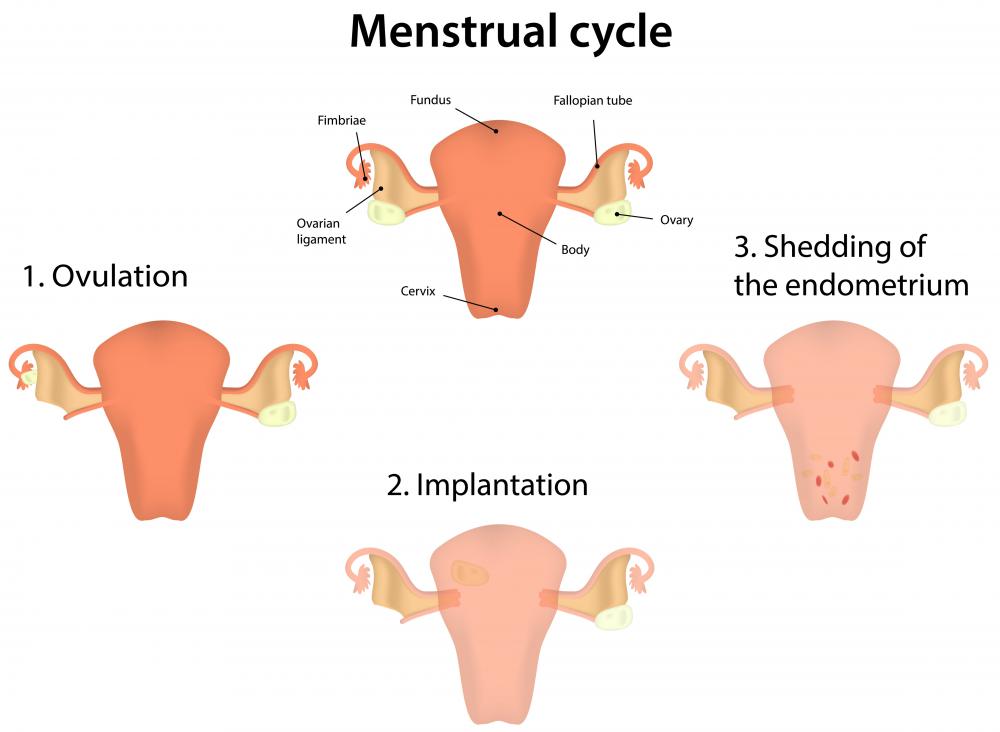At TheHealthBoard, we're committed to delivering accurate, trustworthy information. Our expert-authored content is rigorously fact-checked and sourced from credible authorities. Discover how we uphold the highest standards in providing you with reliable knowledge.
What are the Most Common Causes of Late Menstruation?
Late menstruation could be a result of many different factors. The most common causes include pregnancy, breastfeeding, menopause, medication side effects, weight gain or loss, illness, and both physical and mental stress on the body. While normal menstruation generally occurs between 11 and 13 times per year for most women, others naturally have longer cycles. It’s best to consult a doctor if irregular or late menstruation occurs, especially for patients who might be ill or pregnant.
Pregnancy, breastfeeding, and menopause are the most common natural causes of late menstruation. During pregnancy, the body conserves the endometrium, or uterine lining, which develops into the placenta to provide nourishment for the growing fetus, instead of being shed through the process of menstruation. Breastfeeding women might also experience irregular menstruation, as the hormones involved in breastfeeding suppress ovulation and endometrial growth. Menopause, the process by which women gradually stop ovulating and menstruating, can be another common cause of delayed menstruation in women who are perimenopausal, often between the ages of 45 and 55.

For women who are not pregnant, breastfeeding, or perimenopausal, new medications or dosage changes can be a main cause for late menstruation. Many medications, including hormonal birth control pills, can interfere with a woman’s natural hormonal cycles and initially delay menstruation. Some birth control pills are designed to suppress menstruation entirely, while others may do so inadvertently. Other drugs, especially hormone-related drugs, can also create irregularities is a woman’s cycle.

Stress is also a common cause for a missed period, whether it is mental stress, such as anxiety, or physical stress, such as illness or dietary and exercise changes. Weight gain and weight loss can sometimes cause a late period as well. Any amount of weight loss can deplete the body’s fat stores, reducing the amount of estrogen in the bloodstream and potentially delaying menstruation. Sudden weight gain could be a symptom of another illness, such as hypothyroidism or polycystic ovarian syndrome (PCOS), both of which can cause delayed menstruation.

Diet and exercise changes can not only cause weight loss and weight gain, but also malnutrition or altered hormone levels. Nutrient-poor diets can often lead to suppressed ovulation and menstruation, as the body focuses its energies on survival over reproduction. Other stress factors, such as travel, job-related pressure, sleep changes, or difficult emotional situations, can also lead to late menstruation. These situations can activate the body’s stress response or interfere with the body’s ability to maintain certain hormone levels.
AS FEATURED ON:
AS FEATURED ON:















Discussion Comments
My period is late when the climate changes and when I'm stressed. I've actually gotten used to it now. Whenever I have a late menstrual cycle, I think about any changes that have occurred recently. Even when I travel, my period is late for a few days.
@feruze-- It varies from woman to woman. Menstrual cycle can return within a month or two months for some women after giving birth. For others, it can take a year or even two years.
Are you breastfeeding? Postpartum menstruation usually occurs after breastfeeding is reduced or ended. So it might take a while longer to get your period back. Don't worry.
Cramps can occur because your body is trying to readjust after pregnancy. But make sure that you are using birth control because you can get pregnant even when you're not getting your period.
How long does it take for menstruation to return after giving birth? I gave birth five months ago and my menstrual cycle hasn't returned yet. I get cramps sometimes, but no period.
Post your comments